Iranian Rapper Faces New Charges
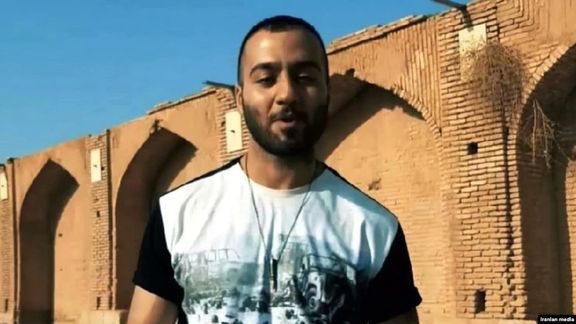
Dissident rapper Toomaj Salehi is facing fresh charges according to his lawyer, as the government battles to silence anti-regime voices.

Dissident rapper Toomaj Salehi is facing fresh charges according to his lawyer, as the government battles to silence anti-regime voices.
Amir Raisian disclosed that Salehi is now accused of "rebellion," indicating an "armed uprising against the system," and of "conspiracy and collusion to commit crimes against security."
Under the Islamic Penal Code, engaging in an "armed uprising against the system" can result in the death penalty.
Raisian said the indictment is at odds with the Supreme Court's recent emphasis on Salehi's eligibility for pardon, explaining that “charges for which Salehi had previously received acquittal judgments” have been reinstated in the renewed indictment.
Salehi was recently imprisoned for one year and 21 days behind bars, 252 days of those in solitary confinement. He was released on bail on November 18th, only to be detained again a mere 12 days later after releasing a video detailing the torture he endured in prison.
In the video, Salehi accused prison authorities and government-affiliated media of wrongdoing, leading to a formal complaint. Raisian condemned the re-arrest, labeling it "against the law" and asserting that Salehi did not fabricate the claims made in the video.
Salehi rose to fame in recent years for his socially conscious rap songs and became a prominent supporter of the Women, Life, Freedom protests. His initial arrest occurred in November 2022 in the village of Gerdbisheh, Chaharmahal and Bakhtiari province, following a period of living in hiding.
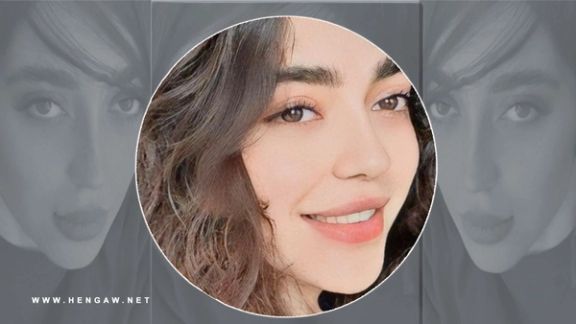
Anahita Amirpour, a 20-year-old student, was shot dead by plainclothes intelligence ministry agents in the city of Borujerd, Lorestan province.
It is believed that Amirpour, a first-semester physical education student at Azad University lost her life when intelligence forces pursued the car she was in. The car's driver, M. Jalayi-far, also a student and Borujerd resident, sustained severe injuries and is currently hospitalized.
Hengaw Human Rights Organization, a Kurdish rights group, says the intelligence forces claim the incident was linked to a recent terror attack in Kerman. Two explosions during the fourth memorial of former IRGC commander Qasem Soleimani on January 3 killed around 90 people in Kerman. The strategy aims to reframe the intentional killing as part of a scripted security case.
It is not clear why the agents tried to stop the car, although some speculate that it could be hijab enforcement related.
Rights group sources indicate that as the plainclothes forces approached the students' car, instructing them to stop and exit the vehicle, the intimidated driver panicked and attempted to flee. Subsequently, the intelligence forces opened fire and seized the car.
Over the past two days, security entities have reportedly pressured the families and friends of the victims not to disclose information about the incident. Two personnel from Chamran Hospital were also summoned and threatened by intelligence authorities.
While security and law enforcement authorities in Borujerd have not issued public statements, Governor Moslem Moradi vaguely referenced the incident, attributing it to recent terrorist attacks and confrontations with criminal elements. Hengaw sources reject Moradi's claims, emphasizing that intelligence forces deliberately targeted the students, leading to Amirpour's death.
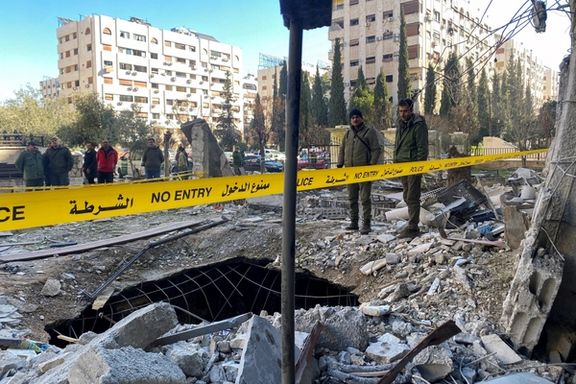
Israeli airstrikes in Syria that killed several IRGC generals have unleashed a barrage of "cutlet" photos online, a popular dish now symbolizing Iran’s slain Guards.
The association started with the targeted killing of former IRGC Quds Force commander Qasem Soleimani, whose body was so mutilated in a US drone strike in 2020 that people described him as a “cutlet,” a popular dish like burgers made of ground beef and potatoes.
Iranian regime opponents observe his death anniversary as "Cutlet Day" on various social media platforms, a symbolic protest act that has seen several people arrested. The recent surge in such surgical strikes has ushered in a "Cutlet Season” as dissident activists took to social media with different photos of cutlets.
On Saturday, the IRGC confirmed that four of its forces lost their lives in the airstrikes on a building in the Mazzeh neighborhood in Damascus. A fifth IRGC officer later succumbed to his wounds and died. Among the dead was Hojatollah Omidvar, also known as Haj Sadegh and Yousef Omidzadeh, who served as the head of the RGC’s extraterritorial Quds force intelligence unit in Syria. According to Iranian state media, Omidvar’s deputy was also killed in the attack.
On December 25, another suspected Israeli airstrike targeted and killed another top Iranian IRGC general, Razi Mousavi, at his residence near Damascus. Additionally, several high-ranking military commanders of Iran-backed militia -- such as Hamas in Gaza, Hezbollah in Lebanon and Harakat Hezbollah al-Nujaba in Iraq – were killed. On Sunday, three more IRGC members were killed in a US-led strike on Houthi rebels of Yemen.
In addition to celebrating “Cutlet Season” and quipping about a more extensive menu by Israeli Prime Minister Benjamin Netanyahu, a photo that is widely circulated is Iran’s Supreme Leader Ali Khamenei surrounded with cutlet patties instead of a group of his inner circle. Another widely shared post is a symbolic weekly schedule of the Supreme Leader, with most of his week spent on funeral prayers for the slain IRGC generals.
The hardline daily Farhikhtegan has published a list of senior IRGC “military advisors” killed since 2015 in Syria, claiming that eight out of the total of 20 have been killed since Iran-backed Hamas started the war against Israel on October 7. The list probably ignored mid-ranking people as it pertains to only seven strikes while Israel has reportedly had around 600 airstrikes since April 2017.
The increasing fatalities among IRGC men have also led to speculations that Israel may have been tipped off about the whereabouts of the targets by Russia. Centrist Aftab News website in Tehran ran an article Sunday -- titled “The coordination between Israel and Russia in Syria is not very hidden” -- citing several Iranian officials and activists who mentioned the alleged coordination.
Lawmaker Mohammad Esmail Kowsari, who is a former IRGC commander, said, “Spies in Damascus must be arrested." Addressing President Ebrahim Raisi, journalist Alireza Mostafa said, “Please ask President Vladimir Putin why the Russian S-400 air defense system is never activated in Syria to protect Iran's interests? Isn’t Russia a strategic ally of Iran?”
According to conservative commentator Sadegh Hosseini, “Since the increased and consolidated presence of Russians in Syria, we have witnessed a rise in Israel’s aerial attacks against Iranian forces. The recent assassinations in Syria underscore the need for a reassessment of Iran-Russia relations in Syria.”
The Islamic Republic's intelligence failures extend beyond overseas operations, evident in the recent twin blasts during Soleimani's death anniversary ceremonies in Kerman. Pointing the finger at Russia while Iranians are mocking IRGC casualties is further proof that Iranians do not take seriously the regime figures who keep threatening Israel with a firm response, but nothing happens.
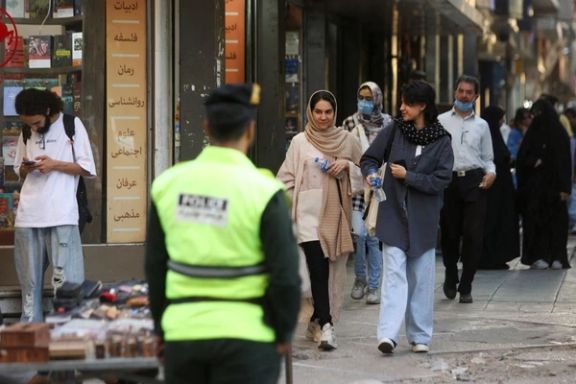
Qom’s police commander says 74,000 text messages have been sent to women in the last 10 months warning them of hijab violations.
Mohammad-Reza Mirheidari highlighted, "The referral of cases to the judicial authorities has increased more than six times compared to last year."
Additionally, he mentioned, "We sealed off nine women's beauty salons, 65 coffee shops, four sports clubs, and nine other complexes."
In recent months, the Tehran police have intensified efforts to curb persistent hijab defiance, leading to the seizure of cars.
Iranian officials have acknowledged the issuance of police warnings through text messages alerting citizens to the imminent seizure of vehicles for non-compliance with compulsory hijab rules.
The police directive reportedly extends to citizens, resulting in the confiscation of hundreds of cars temporarily prohibited from use.
As part of an escalating crackdown on hijab defiance, Iranian parliamentarians have given their approval to the government's Hijab and Chastity bill. The legislation, aiming for stricter penalties regarding hijab infractions, has faced substantial criticism from human rights groups.
The heightened enforcement of hijab regulations follows widespread protests in Iran since the death of Iranian-Kurd Mahsa Amini in 2022. Amini's arrest in Tehran, allegedly for defying the Islamic republic’s mandatory hijab, triggered the most significant uprising in recent history.
Women across the country have been actively challenging the mandatory hijab, resulting in an increased presence of hijab enforcers in public spaces such as subway stations.
Moreover, surveillance cameras have been installed to identify and apprehend individuals violating hijab regulations.
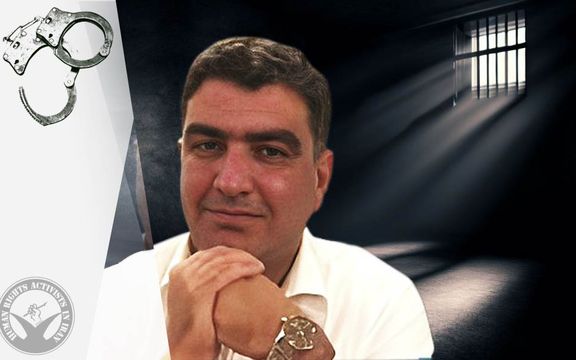
Khosrow Alikordi, an Iranian lawyer advocating the cases of families of protesters, has been handed one year in prison and two years of exile.
The verdict also includes a two-year prohibition on practicing law, travel restrictions lasting two years, and a two-year ban on online activities.
The judiciary accused Alikordi of engaging in "propaganda against the Islamic Republic system and in favor of groups opposing the regime." The lawyer revealed the court's decision on Saturday through his Telegram account.
The court cited Alikordi's interactions with both domestic and international media, as well as his activities and writing on online platforms as instances of "propaganda against the system."
In August, the Mashhad Revolutionary Court, initially sentenced him to imprisonment and additional penalties. The verdict was subsequently upheld by the appeals court.
Alikordi faced legal repercussions after taking on the legal representation of families of the victims of the 2022 uprising, including those of Abolfazl Adinehzadeh and Erfan Rezaei.
Presently, he is also advocating for other political prisoners such as Hossein, Mohammad Hossein, and Fatemeh Sepehri.
Since its establishment, the Islamic Republic has consistently targeted and detained lawyers, civil activists, and political critics.
The government's crackdown on civil, political, and protest activists has escalated since the nationwide protests against the Islamic Republic in September 2022.
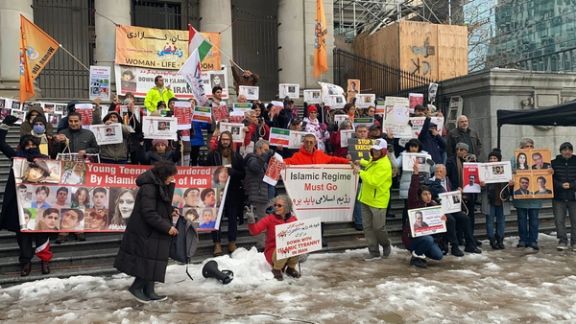
Iranians in 14 countries demonstrated as part of the "No to Execution" global campaign this weekend, against rising death sentences in Iran.
On Saturday, Iranians in Sweden, Canada, Germany, the United States, the United Kingdom, France, Austria, Belgium, Italy, Denmark, the Netherlands, Australia, Finland, and Iraq organized protests.
In Canada, Iranian residents in cities such as Toronto, Vancouver, Montreal, Ottawa, Quebec City, and Calgary braved extreme cold temperatures to voice their opposition to the death sentences.
Demonstrators conveyed their protest by displaying photos of those condemned to death with one hand and holding a symbolic rope in the other.
The global campaign, spanning from January 13 to 20, saw participation from over 100 groups, political parties, and more than 800 Iranian and non-Iranian activists.
Beyond the demonstrations, participants engaged in discussions with authorities in respective countries concerning the ongoing executions in Iran.
According to a report by the US-based Human Rights Activists News Agency (HRANA) on Thursday, at least 12 prisoners in Iran, charged with political or security-related offenses, currently face death sentences.
The political prisoners, held in Tehran, Karaj, Ahvaz, Kermanshah, and Zahedan prisons, have been condemned to execution by the revolutionary and criminal courts of the Islamic Republic's judiciary.
Charges such as "moharebeh" (waging war against God), corruption on earth, membership in opposition parties, and collaboration with foreign states are among the accusations that have led to the imposition of death sentences for the inmates.
Last year hundreds of political prisoners, protesters and those charged with drug offenses were executed as executions reached record numbers.